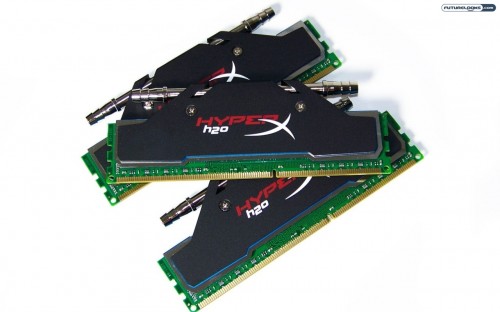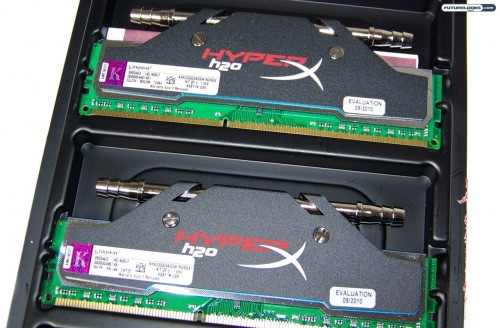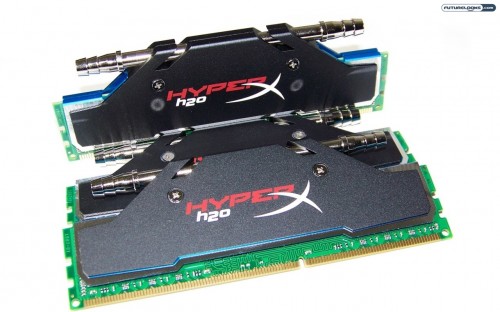
Remember when 2GB memory kits were considered the optimal choice for any dual channel computer? Now, thanks to 64-bit operating systems, 4GB dual channel and 6GB triple channel memory kits are the ideal minimum configuration. Designing more attractive memory modules help motivate consumers and enthusiasts to pick them over others. The HyperX team at Kingston have taken another bold step forward by introducing the HyperX H2O series dual and triple channel memory kits. Is the H2O cool, or does it just look cool?
Features and Specifications

The H2O series gets its name from the potential for being liquid cooled. That’s what those open ended barbs are for. The specs of our particular H2O kit is 2000MHz using 9-9-9-(27 or 30) memory timings via the XMP (Xtreme Memory Profile) settings and require a modest 1.65V to operate 24/7 for years on end. Typically, most motherboards will automatically detect and use this voltage. However, some boards have been known to have a mind of their own so it’s best to double check in the BIOS.
Currently, the 6GB H2o kit here can be found for around $197.99 from the usual places. Comparable 6GB 2000MHz kits range $159 to $169 which means the H2O cost a healthy $30 more. As for dual channel users, you can get the 4GB H2O kit for about $131.99 at the same retailers.
Looking at the H20 Series Up Close
As always, we like to get up close and personal with our review samples. Here, you get a lively look at the H20 with a few useful comments as to how to apply the memory.
It’s been some time since the market has seen a kit like this. The liquid cooling spreaders are pretty unique, but fortunately not required. Read on for more about that.
To Liquid Cool or Not to Liquid Cool

In order to set the memory up on liquid cooling, one must find some the right adapters and 1/4 I.D. tubing that make that possible. Some liquid cooling manufacturers like Koolance offer special sizes that will work with the H2O specs. One could simply split off an existing line and achieve the same results.
The fact is, the H2O memory doesn’t really need liquid cooling to function. Those black heat spreaders are just there to look really neat. If you choose not to liquid cool, the memory will still indeed run stable for years and years just using air. They’ll also overclock the same with or without the liquid cooling. The bottom line is that the aluminum heat spreaders alone are more than capable of cooling the ICs underneath.
Test System Configuration
Since we’ve had really good results with Kingston memory and GIGABYTE motherboards, this is the platform chosen. The GA-X58A-UD5 motherboard offers a slew of memory and CPU settings as well full DDR3 support beyond 2000MHz. Other motherboards like MSI’s Big Bang X58 and ASUS X58 Rampage III also offer similar options. Otherwise, here is our setup:
- Processor: Intel Core i7-980XE Gulftown LGA1366
- Motherboard: GIGABYTE GA-X58A-UD5
- Memory Kit 1: Kingston HyperX H2O 6GB 2000MHz DDR3
- Memory Kit 2: Kingston HyperX V1 6GB 2000MHz DDR3
- Graphics: ZOTAC Geforce GTX 280 1GB AMP
- Storage: Kingston 128GB SSDNow V+
- Cooling: Zalman CNPS10X Extreme CPU Cooler & VF3000N GTX 280
Alright, that’s the break down. This test system seemed to have no problem detecting the proper XMP profile or using it during overclocking. But, it didn’t like some of the manual timings at lower frequencies such as running it at 1600MHz at 7-7-7-21 with stock voltage. In this case, it’s most likely the motherboard getting a little picky unable to do what I want. The important thing is that the memory works to spec at 2000MHz without issue.
Test Methods and Software
Since we’re dealing with a 6GB triple channel memory kit, it’s perfectly fitting that a Windows 7 Pro (64-bit) operating system is used. Yes, it has to be fully patched to make full use of the entire system. The motherboard is also using the latest official BIOS since this does often remove any frequency anomalies.
For benchmarking the memory, SANDRA 2010 Memory Bandwidth, Everest Ultimate Edition, GraySky H.264 Encoding, and Battlefield Bad Company 2 were used. SANDRA and Everest are good for comparing memory bandwidth performance to similar memory kits. GraySky H.264 does a prepackaged 720p encoding benchmark that also benefits from good performance memory. And, BFBC2 is just a good solid game that shows the benefits of memory frequencies and XMP profiles.
